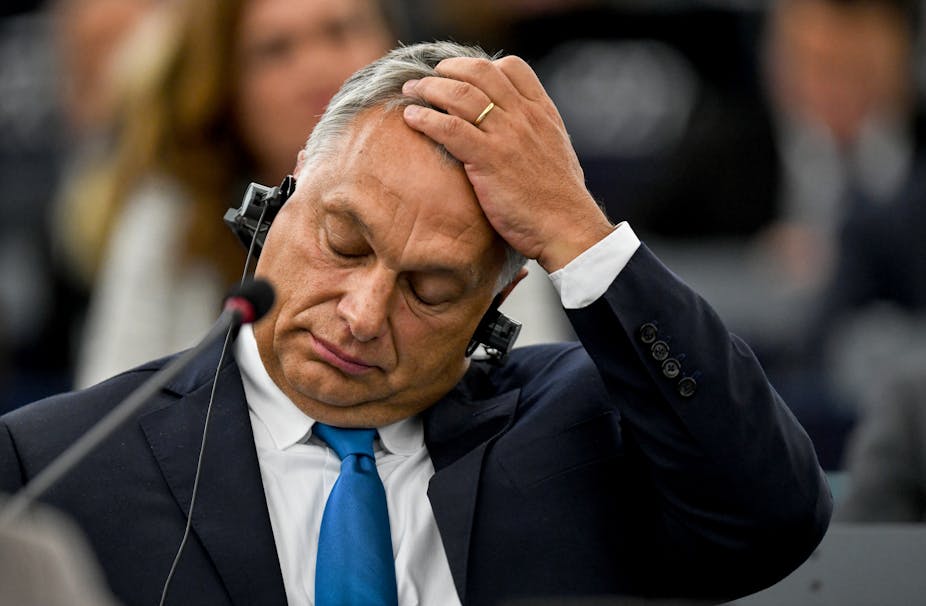The European Parliament has, for the first time in its history, voted to trigger Article 7 of the Treaty of the European Union against a member state for failing to adhere to European values. The parliament and its committees say Hungary has serious problems with respect for human dignity, equality and the rule of law. It is concerned about pluralism, tolerance and justice in the country. It has, for some time, criticised Hungary for the anti-EU turn it has taken since the election of Victor Orbán’s as prime minister in 2010.
Among other things, the parliament accuses Orbán’s government of extensive corruption and of stifling freedom of expression and religion. OLAF, Europe’s anti-fraud office, has carried out ten investigations into how Hungary spends EU funding – making recommendations for change in seven of these.
Transparency International describes Hungary as having “a centralised system of legalised corruption”, with 90% of the media controlled by the ruling Fidesz party and all major Hungarian institutions serving its interests.
The government silences dissent with punitive taxation threats and attacks against NGOs and academic institutions. It is now even planning to ban gender studies within its higher education institutions.
Unapologetic
Orbán has proudly declared Hungary the first illiberal country in Europe. The question from here must be whether the parliament’s vote will have any effect on him at all. Following the parliamentary vote, the European Council – which brings together the heads of member states – must decide whether to sanction Hungary through Article 7. At the extreme end of the spectrum this could include suspending its voting rights as a member state.
A full reprisal is unlikely, not least because of Hungary’s strong alliance with Poland. And Orbán clearly has a strategy. Ahead of the European elections next year, he has been working to build alliances with Matteo Salvini, head of Italy’s Lega alongside his traditional Bavarian, Austrian and Polish allies. With the UK leaving the EU, there will be an extra 27 seats up for grabs in the next European parliament. Orbán hopes to build an anti-migration alliance to shield European civilisation against “invasion” from the east and south.

Hungary and its allies in Europe have tried to frame the debate as being about the difficulties that countries on the periphery of Europe have been experiencing as a result of the increase in the number of asylum seekers. They accuse the EU of interfering in the internal affairs of a member state and argue they are being attacked by the “pro-migration lobby”.
Hungary recently made it a criminal offence to facilitate or support irregular migration – including initiating procedures on behalf of an asylum seeker. Our fieldwork in the southern provinces in Hungary has exposed serious breaches of European asylum procedures in migration management.
In its alleged defence of European borders, the Fidesz government has established transit zones for asylum seekers at its southern border with Serbia to which it accepts just one applicant per day. In August, it stopped sending food to the border in the hope of “encouraging” failed asylum seekers to leave before their appeal cases had been considered. The conditions in the transit zone and “push-backs” to Serbia put Hungary in breach of its obligations to the European Convention on Human Rights.
All in all, the Hungarian situation presents a complete reversal of democratisation and Europeanisation and their replacement by illiberal alternatives.
Will the Hungarian situation infect the rest of Europe? Orbán is keen to expand his anti-migration platform in cooperation with extreme right forces in Europe. Instead of absorbing the parliament’s decision and using it to make changes, he is likely to go on the counterattack. He wants to build a new European order, pushing for a new definition of Europeanisation that hinges less on equality, diversity and humanitarian principles.
The European parliament election in May 2019 will see the clash of two alternative courses for the future European integration. Will Europe stand by its founding principles of openness or will it fall into the trap of fear and populism?

